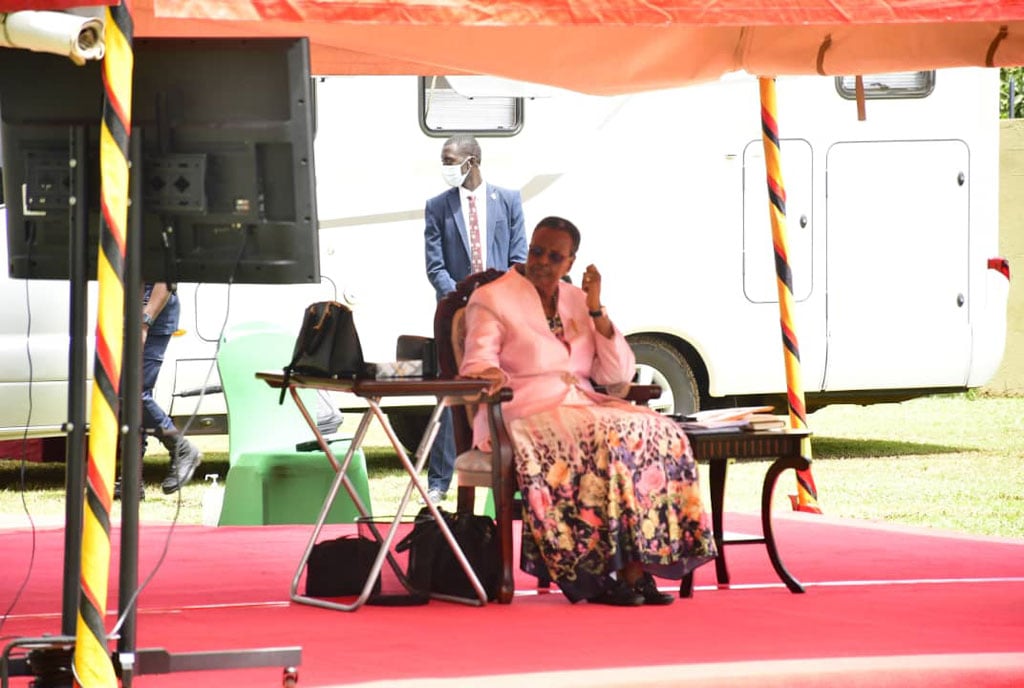Prime
Janet tasks NCDC to review primary curriculum

Education Minister and First Lady Janet Museveni attends the NCDC organized 1st international conference on curriculum development at Speke Resort Munyonyo on April 26, 2023. PHOTO/STEPHEN OTAGE
The Minister of Education, Ms Janet Kataha Museveni, has tasked the National Curriculum Development Centre (NCDC) to review the primary school curriculum and make it more relevant and up-to-date.
Officials from NCDC in an interview with Monitor early this month revealed that they were set to review the curriculum in July. The exercise is expected to cost the government Shs204 billion.
Speaking yesterday during the first International Conference on Curriculum Development in Munyonyo, Ms Museveni said NCDC should not only enrich the new curriculum with contemporary knowledge and information, but also make it enjoyable for both teachers as well as learners.
“I have given a go-ahead for the review of the curriculum for our primary school level of education next financial year, with support from the Global Partnership for Education (GPE). They should make it lean through removing obsolete content, enriching it with the teaching of values and age-appropriate skills to the learners in a learner-centred manner,” Ms Museveni said.
In an interview with Monitor the director of NCDC, Dr Grace Baguma, said the curriculum is not static and the current curriculum for primary education has been in existence for the last 15 years since 2007 when it was last reviewed.
“We are going to reduce the content of all the subjects that are being offered by learners in primary education to make it easy for them to understand,” Ms Baguma said.
The deputy director of research, consultancy and library services at NCDC, Dr Richard Irumba, earlier told Daily Monitor in an interview that the new curriculum will involve introducing Swahili, Science and Social Studies (SST) to learners in Primary One, Primary Two, and Primary Three.
These subjects are currently introduced to the learners from Primary Four and were being taught to learners as sub-topics in literacy one and two, which he said were not being sufficiently covered and taught.
According to him, the move aims at ensuring that learners can comprehend the two subjects from the onset.
“Schools have been implementing a thematic curriculum at this level and the principles of sciences were covered well in literacy,” Dr Irumba said.
Whereas Dr Baguma said the learners will be taught sciences at lower levels in the new curriculum, the Swahili language will be introduced to them in Primary Four.
Background
The conference, which ends today, is one of the activities that have been lined up by NCDC to mark 50 years in existence under the theme “Reconceptualising curriculum in the 21st century for socio-economic transformation.
A number of education experts from within and outside the country are slated to provide their expertise in the review of the curriculum for Primary and A-Level.
Giving the keynote speech, Mr Sheikh Manssour Bin Mussallam, the secretary general of the Organisation of Education Cooperation, listed four pillars of balanced and inclusive education.
Mr Mussallam said the curriculum should be based on context, transdisciplinary, dialectic and intercultural aspects.
He also called for the need to have learners taught in their mother languages so as to ensure inclusive education.
Long-term plan
Ms Museveni expressed the readiness of the government to invest in the curriculum review for both basic and secondary education to ensure that it is in line with the current technology and revolving needs of societies.
“We invested in the review of the Lower Secondary Curriculum that was launched in January 2020. In tandem with this revised curriculum, the ministry is investing in the revising of the A-Level Curriculum to align it with the revised O-Level curriculum,” Ms Museveni said.



